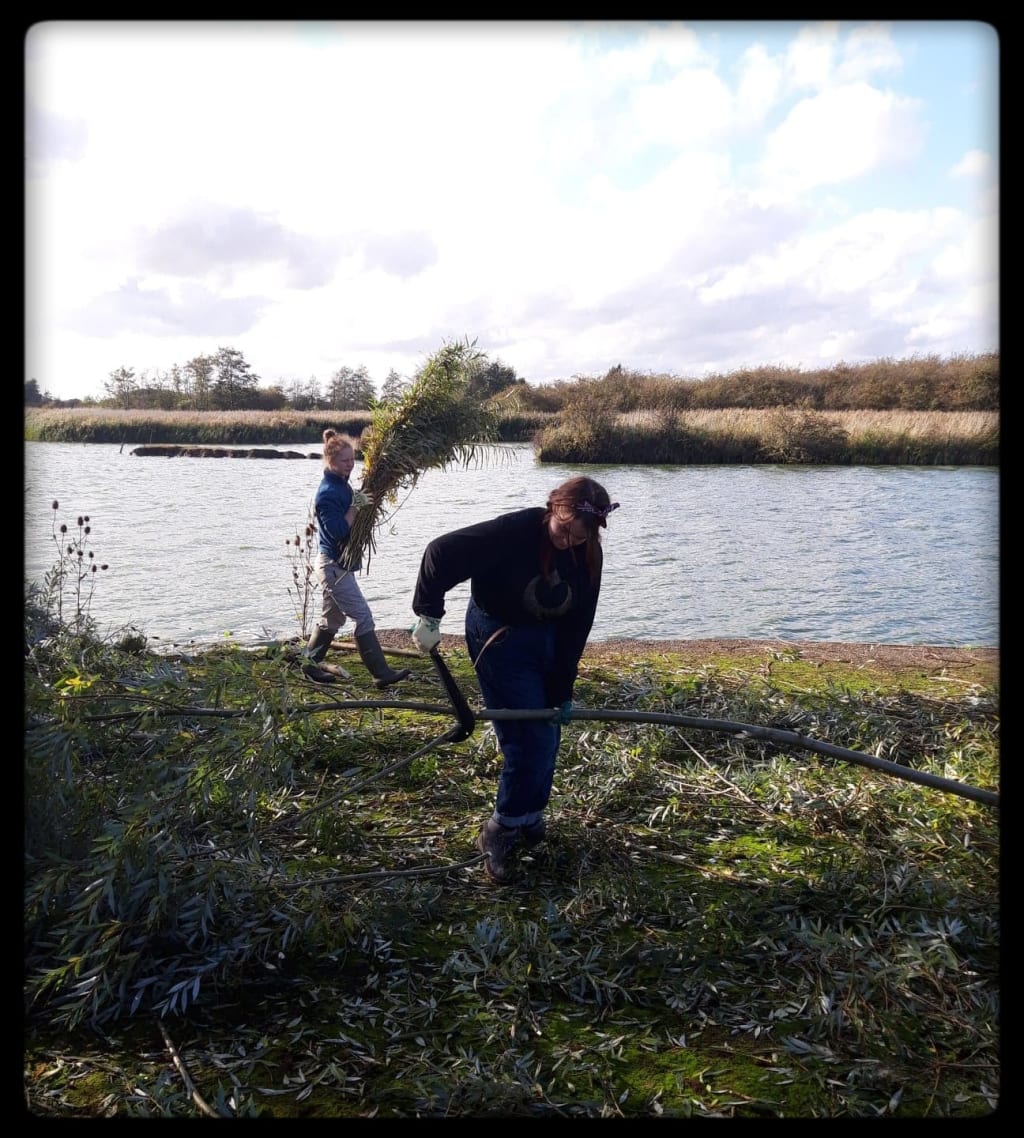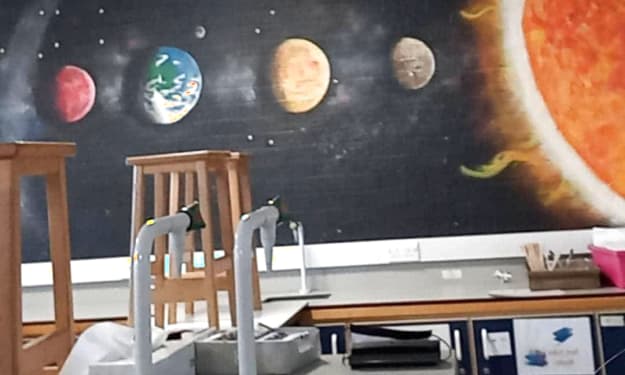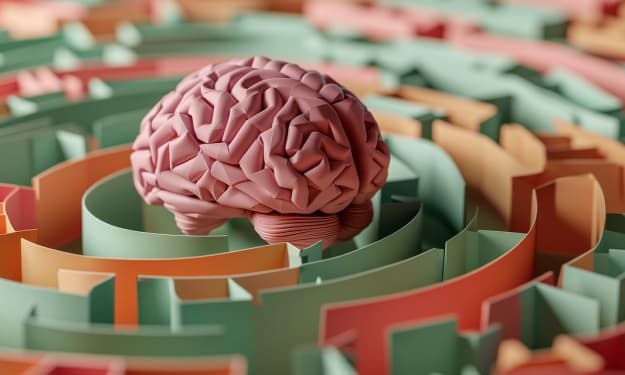
“Jack of all trades, master of none, though often times better than a master of one”
Growing up, I absolutely loved learning. I hated school, but I loved learning. I always wanted to know more and I was always that annoying kid asking "why". From early on in school I showed a talent for maths as it just made sense to me - people don't make sense to me, but numbers do. It was methodical, logical, and explained every single thing in the universe. With this came a love for science and I remember being tucked into the corner of my town's library on a weekend reading science and history encyclopaedias (because I wanted to know everything). I was particularly interested in stellar astronomy, medicine, Greek mythology, world religion and Victorian era history. A common trait of autism is having "special interests" which can change over time or be fairly similar throughout life, and these interests can sometimes (but not always) be things that wouldn't be "typical" of other people. This part definitely rang true for me - I never really encountered other kids that got as excited by new medical ad. Thankfully I do think that is starting to change and it seems more acceptable now to be a bit uncool and geeky and I see more and more young people, especially young girls, showing their love for STEM across social media.
I was always passionate about medicine and still am, realising recently that this lifelong interest never went away. I was "destined" for medical school and loved learning about interesting diseases, cutting edge treatments and cures, and the science behind diagnostics. However, getting the required work experience was difficult living in a small town with restrictive parents who wanted me to go to medical school, but wouldn't sign the forms or help me get the work experience, and my mental health was starting to impact my grades. I still did well, achieving very good GCSEs and I started my A Levels well, but not long into year 12 my mental health hit rock bottom. I left that year with CCCD and felt like a failure - my mum didn't speak to me for a few days, my teachers were upset with me when I got the results, and I was laughed at by others in my year. I'd been held to a high standard and expectation with my grades and this was the first time I'd ever "failed". I was predicted AAAA so this was too big a gap for my school and parents to handle. At the time, it was the most important thing in the world and I was angry at myself for letting my mental health get on top of me. Medicine was definitely gone now they said and I would have to drop biology as it was my lowest grade. That's when I switched to focusing my study on physics as this was my other main passion - space. In year 13 I struggled with what to do long-term - I didn't feel I had good enough grades to go to university (I did! TIP: Many universities do foundation years now too if you don't get or have required A Levels!) as my teachers were telling me I'd ruined my chances. They just meant I'd ruined my chances of getting into Oxford or Cambridge, which was more about making the school look good than what I wanted. Eventually I talked my teachers into predicting me BBB and I found several universities that had entry grades for physics below this. I even got an offer for an ABB university and suddenly realised this was my way out of my life. I worked the hardest I probably ever have, unfortunately at the detriment of my mental health again but I would push it away long enough to get A*AB on results day. I was excited to study physics and attending lectures by the Institute of Physics throughout year 12 and 13 built the excitement and passion I had.
I always found this system quite restrictive. Sometimes in school, I had questions with answers that weren't in the exam syllabus, so they didn't get answered. "You don't need to know that" Well what if I want to know it? The more I knew the better I understood - it is well documented that the more perspectives and evidence for something, the easier conclusions are to draw. I understood what I was learning the more I learned and the more I got the chance to apply that learning in different places. We first learned calculus in maths, then we started to use it in physics. Learning the applications in this context only improved my understanding of the methods I was using. The more abstract a link between subjects the better, no matter how big or small the learning was - studying Latin meant I could answer why certain letters didn't show up on the periodic table and improved my vocabulary in English, I attacked translations in French and Latin in the same way I tackle a mathematics problem. Most of this linked learning was done in my own time, though, and I felt school rarely focused on it. It is well known among educational professionals that students find it difficult to link learning between subjects - for example, a student might confidently approach a maths problem in maths, but if you ask them to do maths in science it can seem harder for them. I encountered this a lot as a science teacher - even students who were high achievers in maths couldn't solve simple mathematical problems when placed in a science context. We divide "science" into biology, chemistry, and physics and I even saw this issue here - asking my biology students to write a chemical equation for respiration and they all panicked saying this wasn't a chemistry lesson and they didn't remember. I broke down the question more and showed them that they could do it but it made me realise how little we emphasise that all our subjects are interconnected.
Having to choose a specialist route before I was even legally an adult was impossible - I was never happy with what I picked and it took me a long time to realise I’d never be satisfied with a one-field career path and that it was an option! I did the core subjects and chose French, geography, Latin and ICT for my GCSEs. I had to pick one humanities (geography was seen as more academic) and one language. ICT was chosen by my parents - I'd wanted to do religious studies but my parents were against that. There was no space left to do any art. I studied physics, chemistry, and maths at A Level. Going back I’d love to do an arts/humanities subject but I had always been discouraged from exploring them and pushed towards science. Discovering my love for the arts and humanities has only furthered my aim to experience and contribute to multiple fields and I wish I had the opportunity to explore this when I was younger.
Initially I studied physics at university, but I was in a very bad state with my mental health and a lot of recent trauma meant I struggled to engage and I felt like I’d picked the wrong subject. I was angry at myself for making the wrong choice. It felt like every decision I made was wrong, and university was so final - it would be hard to fund another degree and it felt like my only chance. I’d always been interested in the environment and sustainability but was generally directed away from this, especially by my parents who didn’t really believe in it and my teachers who thought it wasn’t “prestigious” enough as a science. I was friends with someone at the time who studied zoology and it seemed perfect. As much as I did find my degree interesting, this decision was probably some kind of rebellion. It helped in some ways as I felt like I’d finally been able to make my own decision about something entirely by myself. I didn’t let anyone pressure me or dissuade me and now I lived away from home I wasn’t afraid of my parents’ reaction. I had some great experiences though, like a ten day field trip to Mallorca where I discovered how much I love sea swimming, practical conservation experience with the Wildlife Trusts, East Yorkshire Bat Group, and the North Yorkshire Pine Marten Support Project. University on the whole was a fairly negative experience, and my department weren't great in a lot of ways, but I learned some incredible things and grew my love for wildlife and the environment. I still didn't feel like I was in the right field, though. I still felt like I should've been doing something else. After an internship at a local college, I decided to do a PGCE and train to be a science teacher. This was driven by my own experiences in school but ultimately it made my mental health a lot worse and I felt like there was too much resistance to change in a system that most people will admit doesn't work. This experience undoubtedly taught me the most about myself though and I gained confidence I never thought I would. Now, I'm delivering education in things like first aid and mental health to community groups. I like it and it's so far one of the nicest jobs I've ever had, but it's a one year contract and I do feel like that will be the end of my career in education. I am undecided yet as to what I want to do afterwards - I'd love to go back to university but it's a big decision and potentially expensive. I'm considering distance learning postgraduate study and finding a job in something closer to my degree once I can drive. Although I've been exploring arts and humanities more, I am likely to stick in a scientific career in the future just down to likelihood of opportunities and skill background. I do think this is a shame, as if I'd been encouraged more to study a wider range of subjects I would feel more confident and have more experience in approaching an arts based career.
As a scientist, I always loved the intersections of the sciences - I didn’t JUST like biology or physics or chemistry, I loved where biology and physics met. Same with chemistry and biology, chemistry and physics, maths and biology and every other combination of subjects. I loved being able to recall my knowledge from one area and apply it to another - for example I loved exploring renewable energy in GCSE geography and linking it to similar topics in physics. I never had a favourite subject. I loved them all, but I definitely felt the pressure to go down the scientific route as my academic strengths lay there. Maths was always my absolute favourite, but generally because it underpinned everything else I learned about. It opened up whole new worlds to me and it made it make sense. I liked English, although I struggled with the exams and had to work my hardest for these out of any subject. I loved English literature but generally felted restricted by the reading list (still have a soft spot for An Inspector Calls). Religious studies always fascinated me and I found religion beautiful in many ways. I was raised in a household that had a staunchly anti-religious belief and I could never understand why. I loved when we visited temples and mosques and churches on school trips, even though my mum would always complain I was going to be "indoctrinated". Until secondary school I believed the same as my parents - I didn't believe in any religion and that made me more intelligent than others. Religious studies opened up my world view and made me less judgemental of others. I always had a strong sense of justice and would get into lengthy debates with my peers in these lessons. When it came to choosing my options for GCSE, though, I started to feel the restriction. I felt this even more when choosing my A Levels (I think I had 10 subjects on my initial list of options), and even more when choosing a degree (just ONE subject?!). Natural sciences degrees are more common now and if I was starting university now I'd probably have gone for something like that. I think it's why I wavered so many times on my degree choice - I didn't want to just do one.
In modern times, we generally get kids to pick their GCSE options, already thinking about a career, at about 13 or 14 years old. They pick their A Levels at about 16 and their degrees at about 17 or 18. I'm only 25 and already a completely different person than I was at 13, 16, even 18. Especially those of us that go through significant trauma and mental health struggles, we "find ourselves" over and over again and can have an unsteady sense of identity that can make it hard to make big decisions at the best of times, let alone still as a child. If that identity is moulded by others, it can be even harder to know what we really want and are good at. I struggle to identify my own skills, as others have always just told me "you're good at maths and science", but those aren't really skills. Subjects are just how we split up knowledge to make it easier to approach. Skills are how we actually learn those subjects and what those subjects or knowledge teach us. Skills are transferable and many important skills in science are important skills in art. Growing up I idolised the polymaths - I loved learning that no one was really just a physicist or a biologist. They were astronomers, authors, philosophers, doctors, poets, religious leaders… all at the same time. I'd love a life like this, a journey of research and combining knowledge to improve technology and science.
So recently, I decided to give up on finding "the career". I accept that I will change and develop my career as I grow as a person, especially during recovery, and I may find myself in opportunities in 10, 20 years that I had never even considered. I will explore things that genuinely excite and interest me and find new ways to combine what I already know with things I don't already know.
Some people will think this looks like I can’t commit, or that I’m indecisive and that’s fair enough, but I think we need to recognise that it is perfectly normal for your career to change as you grow. Already by 25 I have had many experiences that have changed me as a person, so how many will I have had by 40, 50, 60? Sometimes our life can change in ways that mean our current job doesn’t really fit in. These can be life changes like starting a family or moving to a new city, or maybe you are now able to access education you couldn’t in the past, or maybe you don’t like your work-life balance. Change is natural as we grow and I think we should respect those with a varied professional background. I have wondered if this is just a psychological response to feeling boxed in and pushed in one direction throughout school, but I do think this is something you could experience even without that. It is very ingrained in our society to have "a" career but I don't think it's actually very feasible, especially with the rate at which technology is advancing.
At the moment, I'm thinking radiography - it's biology and physics and focused in medicine. I love caring for people. It's a high candidate now but possibly financially not a smart move right now. I’d also love to become a librarian, do an astrobiology PhD, work in data science, grow plants in a nursery.... I’m still young and I don’t know where I’ll end up. I think that’s part of the fun - there are opportunities out there you might not have ever thought of before. I know I felt it overwhelming when I realised as an adult how many different jobs there are out there that I had never heard of before. Expecting children to decide a life path when they haven't even discovered a handful of the possibilities is a recipe for adults that feel lost and undecided and I think we should support people more to make career changes and widen their educational background.
About the Creator
sparrow
documenting my mental health experience and my recovery journey






Comments
There are no comments for this story
Be the first to respond and start the conversation.